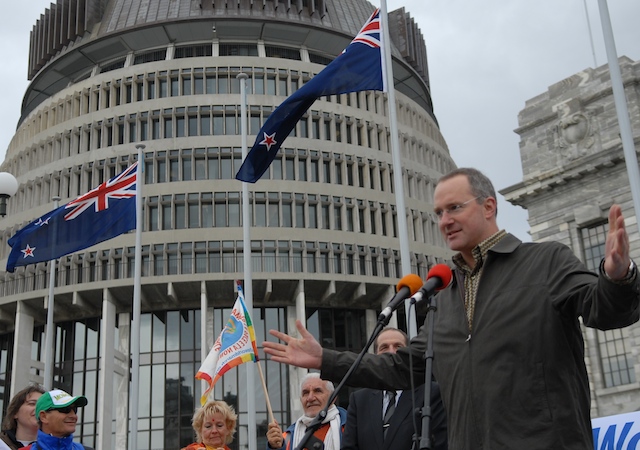A private member’s bill to ban depleted uranium (DU) was defeated in the New Zealand Parliament during its first debate on 27 June 2012 by a vote of 60-60, failing to achieve the positive majority necessary to forward it for Select Committee review. The draft legislation was opposed by the governing National and Act parties, but failed because the Maori Party, which was supporting the bill, was only able to cast two of its three votes.
Introduced to Parliament by MP Phil Twyford (Labour, Te Atatu) on 9 September 2010, the Depleted Uranium (Prohibition) Bill aimed to ban the possession, use, sale, manufacture, testing and transit of uranium in all conventional munitions and armour within New Zealand and by agents of the New Zealand government. As he led off the debate on 27 June, Twyford explained that the draft legislation sought to apply a “precautionary principle” to depleted uranium (DU) weapons by banning their use until definitive research can prove that those exposed to DU in combat areas are not adversely affected by its radiation and toxicity.
National MP John Hayes, chair of the Foreign Affairs, Defence, and Trade Select Committee, led government opposition to the Bill in the absence of Minister of Foreign Affairs, Hon Murray McCully, who assumed responsibility for the disarmament portfolio in December 2011. Hayes expressed strong reservations about the impact the Bill could have on New Zealand’s military relations with countries that may use depleted uranium weapons. Last week New Zealand signed a defence pact with the United States, signaling more active military relations and interaction on “interoperability” issues.
Other National MPs–Tau Henare, Sam Lotu-Liga, Jamie Lee Ross, Michael Woodhouse–criticized the lack of evidence on the adverse health risks posed by depleted uranium, questioned the issue’s relevance to New Zealand, and pointed out that when the petition that led to the Bill came to Parliament in 2005, the then-Labour government didn’t want to tackle it.
Labour MP Phil Goff highlighted how strong national measures enable international leadership, as was the case for New Zealand on the prohibitions of both antipersonnel landmines and cluster munitions. Labour MP Maryan Street asked where government leadership on disarmament matters has gone? (Earlier in the day, a motion by Street supporting the negotiation of a strong Arms Trade Treaty was passed by the Parliament.)
Maori Party co-leader Pita Sharples was absent as he was attending the funeral (tangi) for World War II veteran Major Hoani Waititi, but government process doesn’t allow adequate proxy votes for Maori under special, culturally important circumstances.The next day Sharples apologized that he was not present for the vote and confirmed the Maori Party’s support for the legislation.
The Greens supported the Bill with MP Gareth Hughes, highlighting that nuclear free New Zealand has been used as a transhipment point for Australian yellow cake uranium bound for the US. New Zealand First supported the Bill with MP Richard Prosser, citing his previous work designing anti-tank weapons for the defence industry. United Future (Peter Dunne) had not indicated what it would vote for prior to the debate, but supported the Bill being referred to Select Committee for review. The Mana Party (Hone Harawira) also voted for the Bill.
The International Coalition to Ban Uranium Weapons wrote an open letter to New Zealand parliamentarians, responding to concerns raised on the Bill, and has expressed disappointment at the outcome. New Zealand is one several countries where parliamentarians and civil society are taking action to express their concern about the use of DU in weapons and the risks that it poses to human health and the environment. In 2007, Belgium became the first state in the world to impose a national ban on all aspects of DU munitions and Costa Rica followed in 2011. Ireland is considering a similar ban.
Peace Movement Aotearoa issued an urgent action alert and other information about the DU bill, which stated that the New Zealand Defence Force (NZDF) does not use depleted uranium weapons and in 2009 then-NZDF Chief Jerry Mataparae told the Foreign Affairs Select Committee that the NZDF would prefer its allies did not use DU weapons. Peace Movement Aotearoa has issued a summary on the outcome of the debate.


Leave a Reply